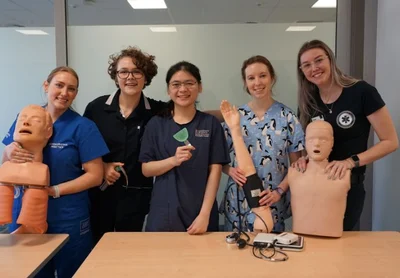Uni students share their passion

A dentist, an anaesthesiologist, two nurses, and a paramedic - no, it's not the start of a bad joke.
They were actually five university students who found themselves out of lecture halls and back in the classroom this week.
They’re on a mission to recruit young people into the health sector - specifically, young rural kids.
Molly Hanning, Kathy Toms, Olivia Liong, Emily Lake and Kaylee Bezett ran a workshop for students at Ashburton College on Tuesday, educating them on careers in health.
The quintet talked to students about their disciplines, uni life, and what to study in high school when preparing for tertiary.
Then students got to play doctor with some of the teaching equipment from universities - plastic arms with a pulse, stethoscopes and tooth moulds, to name a few.
The tertiary student health workshops are an initiative run by the Hauora Taiwhenua Rural Health Network.
The initiative aims to ensure a population of health professionals exist in rural regions, where they’ve historically been in short supply.
Kathy Toms, a second year nursing student at the University of Auckland, said working in smaller communities has its rewards.
“In rural areas, you know more people than you do in cities, so you get to reap the benefits of your labour.
“When you’re in a rural area, people really know you. There’s this trust that you have with your community, and that’s why I’m interested in working rurally as well.”
“It’s wholesome knowing you’re giving back to your community, you might end up helping someone you grew up with,” Olivia Liong, a dentistry student at Otago University, said.
Scholarships, both from universities and organisations like Te Whatu Ora, are in abundance, and the crew encourages highschoolers to start research early.
Universities also set aside a portion of spots for rural students, to create a pool of knowledge which goes back into rural communities.
Students can also join St John and take first aid courses to further their experience while in college.
No boys showed up to the workshop, which is an imbalance seen across the health sector, Toms said.
“It’s really important to try and get men into healthcare, especially nursing”.
She said men can be uncomfortable with female doctors, just as women can be with male ones, and it’s important to have both options available for patients.
Group lead and Whitireia nursing student Emily Lake, who grew up in Ruapuna, said the country needs health professionals now more than ever, and that jobs are essentially guaranteed.
“Nurses really are the backbone of health in New Zealand, alongside doctors and everyone else.
“Knowing that you’re getting into a career, knowing you’ve got job security, and knowing you’re going to make a difference in your community is really rewarding.”
The quintet will travel further south over the week, finishing off on Friday in Oamaru.
By Anisha Satya

